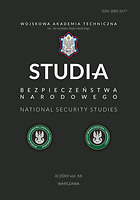PANDEMIA COVID-19 JAKO KWESTIA BEZPIECZEŃSTWA. UDANA SEKURYTYZACJA?
THE COVID-19 PANDEMIC AS A SAFETY ISSUE. SUCCESSFUL SECURITIZATION?
Author(s): Paulina PolkoSubject(s): Security and defense, Health and medicine and law
Published by: Wojskowa Akademia Techniczna im. Jarosława Dąbrowskiego
Keywords: health security; pandemic; Sars-Cov-2; securitization; riskifikation;
Summary/Abstract: The aim of the study presented in this article was to analyze the process of securitization of the Sars-Cov-2 pandemic in 2020 and 2021 as a process of creation of a global existential threat, requiring the implementation of extraordinary solutions in order to eliminate it. The following hypothesis was verified: the Sars-Cov-2 virus pandemic underwent the process of successful securitization, mainly in Europe and North America, but it was completed with desecuritization and the transition to subsequent phases, referring to the logic of other theories related to the expansion of security categories. The analysis was made using three theoretical frameworks: The Theory of Securitization (Copenhagen School), The Theory of Just Securitization (R. Floyd) and The Theory of "Riskification" (O. Corry), by the method of analysis and synthesis, by means of induction and deduction. These theories are considered appropriate to be used in the research due to their nature. The classical Theory of Securitization formulates the basic framework and requirements of the process of including new problems in the security category. The Just Securitization Theory, which is critical to it, specifies the legitimacy of securitization depending on the existence of the threat. The Riskifikation Theory refers to the process of including risks (potential threats) in the security category and applying extraordinary measures to them. As a result of the undertaken research activities, it was established that the successful securitization of a pandemic threat did not end in desecuritization, in line with the assumptions of the Securitization Theory, but went into the process of "riskification", i.e. transformation from reacting with extraordinary measures to a significant, objective existential threat to respond to the risk of such a risk. threats, which have significant consequences for the organization of the process of ensuring health security. These findings are important for understanding the processes of including new threats (and risks) in the security category and how to manage them with exceptional measures. The presented research results may be useful in the case of subsequent sudden threats similar to the Sars-Cov-2 pandemic, in order to assess potential ways of combating them and counteracting their effects.
Journal: Studia Bezpieczeństwa Narodowego
- Issue Year: 23/2022
- Issue No: 1
- Page Range: 27-43
- Page Count: 17
- Language: Polish

